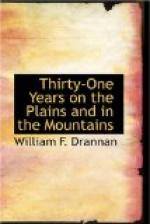On our return the Colonel had everything ready and we pulled out for San Francisco. We camped the first night at Steamboat Springs, a place that has since grown to be a famous health resort. On the second day we passed over the country where now stands Carson City, the capital of Nevada. At that time, this region, like all of that country then, was a wild, unsettled, sagebrush desert, or mountain wilderness.
The morning we left Eagle Valley the Colonel rode in advance of the column with me, and I saw there was something on his mind. In a little while he said he would like to kill a deer with big horns, so that he could send it—the horns—to his father in New York, who had never seen a deer, and he added that notwithstanding he—the Colonel—had been on the Pacific coast two years, he had never killed a deer in his life. I told him that I would fix it for him to get one the very next day, and he was as pleased as a child.
That night we camped by a big spring at the mouth of a great canyon, and about the spring stood a number of large pine trees. Many persons who had passed that way had carved their names in the bark of the trees, and among the names were two that were quite familiar to me. One of these was the name of Capt. Molujean—I wondered how he had done it without stuttering—and the other was the name of James Beckwith. On the same tree was written with lead pencil: “Sixty miles to Beckwith’s Hotel.”
On my favorite horse, Pinto, I rode out with the Colonel for a deer hunt. While riding along the canyon about two miles from where the command had camped, I saw a large doe crossing the canyon and coming down the hill toward us. I signaled the Colonel to halt and I shot the doe, breaking her neck, while sitting on my horse. I then told the Colonel to secrete himself behind a tree and he would soon see the male deer, and he would stand a good show to get a fine pair of horns. In a few moments two deer came tracking the one I had shot.
“Be ready, now,” said I, “and when he stops let him have it.” So when the deer were within about fifty yards I gave a keen whistle and they stopped, stock still. The Colonel fired and brought the big buck to the ground. The other, which was a small one, started to run, but I sent a bullet after it that made more venison.
We now had plenty of meat, and the Colonel was as proud over killing that deer as I was over my first pair of boots.
We stopped here until the command came up, dressed the venison and went on our way rejoicing.
Soon we were ascending the Sierra Nevada Mountains, and about three o’clock we struck the snow-line.




